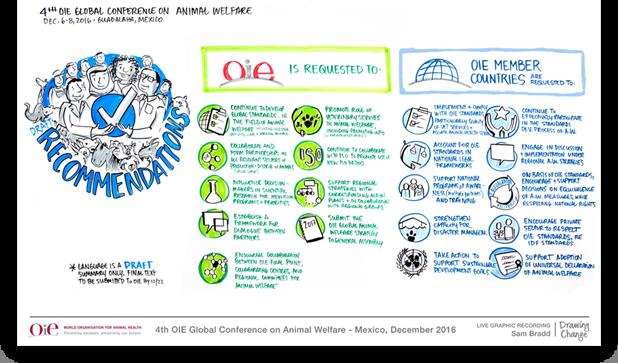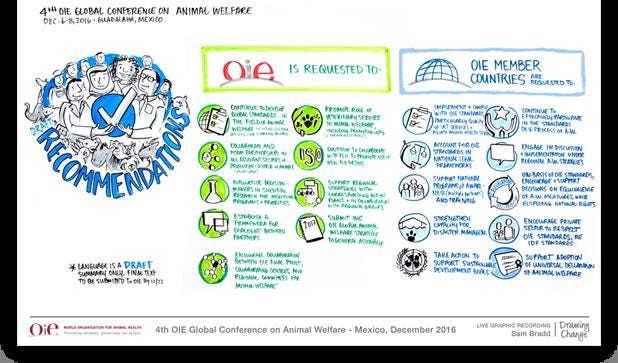Recommendations and draft OIE strategy on animal welfare will be presented for adoption during OIE general session in May 2017.

After three days of discussions, the 430 participants in the World Organization for Animal Health's (OIE) fourth Global Conference on Animal Welfare endorsed a range of recommendations aimed at furthering the improvement of animal welfare worldwide, which is one of OIE’s priority domains of work.

The recommendations adopted by all conference participants as well as the draft OIE strategy on animal welfare will be proposed for adoption during the 85th OIE general session in May 2017.
In addition, a draft "Global Strategy on Animal Welfare" was presented to participants for the first time to serve as a basis for discussion during the event. This strategy notably recommends the establishment of a new forum designed to improve the opportunity for ongoing engagement among technical experts and the numerous stakeholders involved in the development and review of OIE international standards on animal welfare.
Hosted by the government of Mexico, the conference addressed a number of relevant topics, chiefly the importance of developing partnerships to encourage the effective implementation of OIE animal welfare standards by member countries; the future development of animal welfare science, including emerging technologies used for their assessment, and preparedness to face natural and manmade disasters in relation to animal health, animal welfare and veterinary public health.
A more detailed overview of the themes covered during the conference can be accessed in this slideshow.
“At a time when environmental issues are becoming crucial, there is a growing awareness that animal welfare is consistent with sustainable livestock development, and this will undoubtedly contribute to the development of new, more animal-friendly practices,” OIE director general Dr. Monique Eloit said at the conference opening.
In food production systems, for instance, attention to animal welfare can improve productivity, quality, food safety and economic returns and, therefore, contribute to food security and economic prosperity, OIE said.
“Today, the real challenge is to guarantee animal production food safety by enhancing the synergies that allow us to control the animal diseases which endanger the public health and are a threat to other countries with commercial relations,” explained Jose Eduardo Calzada Rovirosa, representative of the Mexican Food Secretary. “The only way to guarantee animal health is through the protection of animal life, health and welfare, and this will result in a positive impact on human health.”
Animal welfare has been one of OIE's priority topics for the last 15 years and is part of its mandate, through which OIE elaborates science-based standards that are recognized by the international community as reference in this field.
At the conference, a new stage was reached: Participants endorsed the basis of a future OIE global strategy on animal welfare, built on experiences and outcomes of regional strategies already implemented across the world. Its vision is to reach “a world where the welfare of animals is respected, promoted and advanced, in ways that complement the pursuit of animal health, human well-being, socioeconomic development and environmental sustainability.”
OIE explained that this strategy is based on the following four elements:
1. Development of international animal welfare standards. The strategy proposes, in particular, establishing a new forum that will bring together members of the animal welfare research community, the global animal welfare movement and the global animal-source food sector. This forum will seek to establish a framework for deepened dialogue among all stakeholders involved in this field to ensure ongoing support and commitment for the elaboration of new standards.
OIE is expected to further publish global standards based on both science and practical experience, notably for livestock production systems and working animals.
2. Enhance capacity building and education. As key players in animal welfare issues, veterinary services (including public- and private-sector veterinarians) need to have accurate capacities. OIE has described its responsibilities in both the Terrestrial Code and Aquatic Code and included appropriate references for their coverage in veterinary education and in the OIE PVS (Performance of Veterinary Services) Tool.
3. Communication with governments, organizations, veterinary services, educational institutions and the public. Ensuring the welfare of animals is a responsibility that must be shared among numerous stakeholders. Mutual recognition and constructive engagement among parties are necessary to achieve sustained improvements to animal welfare. Member countries are highly encouraged to support the development of national programs for raising awareness of animal welfare and educating key players, particularly livestock owners, animal handlers, religious and community leaders and other key groups, such as school students.
4. Implementation of animal welfare standards and policies. The progressive implementation of OIE standards on animal welfare will support the capacities of member countries to achieve some sustainability developments goals. Therefore, following the conference, member countries are urged to integrate OIE standards in their national legislations so as to effectively integrate the 16 existing standards on animal welfare in national action plans.
The conference also welcomed the publication of the International Organization for Standardization's newly adopted ISO Technical Specification on animal welfare management and the general requirements and guidance for organizations in the food supply chain, consistent with existing OIE animal welfare standards.
The texts of the strategy and the recommendations will be submitted to the World Assembly of Delegates for adoption at the 2017 OIE General Session.
About the Author(s)
You May Also Like

.png?width=300&auto=webp&quality=80&disable=upscale)

